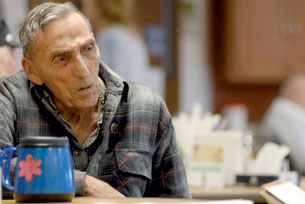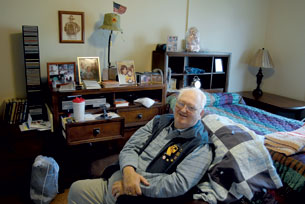Don Doane, who spent three years training World War II soldiers how to operate heavy equipment and shoot bazookas, believes cigarettes saved his life.
Doane’s near-death experience came after his service in the United States Army, when he was back home in his native Flathead Valley. It was 1951 and Doane was hunting with buddies in the South Fork when one of the hunters accidently discharged his rifle.
“The bullet went through the guy ahead of me and killed him,” Doane, 85, said. “Then it stopped in me.”
A smoker at the time, Doane had two packs of cigarettes in his coat pocket. The bullet tore through both, but Doane figures the packs were thick enough to detour the bullet to his back, where it lodged near his spine.
Today Doane suffers from painful multiple sclerosis, due to what doctors call a complication from the injury, but he knows he’s fortunate to be alive.
“I think the cigarette packs saved my life,” he said last week in an interview the day before Veterans Day.
Like other residents at the Montana Veterans’ Home in Columbia Falls, Doane is a story machine – deposit your question and he’ll dispense a tale. The nursing home is a place where you will hear endless anecdotes of lives fully lived, deaths escaped and genuine heroism. These men’s lives, and their stories, are interwoven by two common threads: war and the Flathead Valley.
The facility is one of two veterans’ nursing homes administered by the state Department of Public Health and Human Services. The other is in Glendive, though it is operated in partnership with a local medical center, making the Columbia Falls home the only completely state-run operation, according to Administrator Joren Underahl. Underahl, who served in the Army for 20 years, took over last fall.
According to the 2000 U.S. Census, Montana has almost 110,000 veterans, accounting for 16 percent of the adult population, one of the highest rates in the nation. Underahl is waiting for the 2010 Census numbers, but he figures the Treasure State will be near or at the top again.
These veterans are scattered across the state, but a large concentration can be found in blue-collar Northwest Montana. Some residents at the nursing home have roots in the region dating back nearly a century.
Veterans often carry scars, both physical and emotional, so a comfortable place to call home – surrounded by people who understand their plight – can make all the difference in the world, particularly as they reach their later years. It is the goal of the Montana Veterans’ Home to provide that service.
The home was authorized in 1895, six years after Montana became a state. Two years later, the first resident was admitted. Today, there are 105 beds at the skilled nursing facility, including 15 beds in a special care unit dedicated to residents with advanced dementia and Alzheimer’s disease.
Additionally there is a 12-bed domiciliary for independent veterans who aren’t in need of nursing care. These residents come and go in their own vehicles. The home also provides transportation.
All residents are either honorably discharged veterans or spouses of honorably discharged veterans. Funding comes from state cigarette taxes, the Department of Veterans Affairs, Medicare, Medicaid, private pay and insurance.
The facility offers a pharmacy and occupational, physical and speech therapy. Other services include housekeeping, laundry, meals, financial help and activities. Last week, live music was slated for each day.
“They really enjoy music,” volunteer coordinator Renee Lennick said.
Underahl said the full-time equivalent of total employees at the facility is 143, though he estimates there are actually 180 or 190 individuals altogether. More than 300 volunteers help out as well.
“There’s so much community support here,” Underahl said.
Doane, who has been a resident for two years, cruises around in a wheelchair and tells stories to anybody who wants to listen. And at the veterans’ home, there’s always somebody who wants to listen.
“I love it here,” he said. “As far as a rest home goes, it’s hard to beat. It’s just the way you’re treated. Everybody’s perfect here.”

Name: Don Doane
Age: 85
His Story: Doane was raised in Columbia Falls and at 18 he signed up for the U.S. Army. From 1943-1946, he was stationed in Fort Lewis, Wash., where he trained soldiers bound for combat in World War II. Using his teenage work experience in truck driving and heavy machinery operation, Doane taught soldiers how to drive big military rigs. He also taught them how to shoot bazookas.
Quote: “You’d be surprised. A lot of the guys were out of New York or some other place and they had never shot a gun before. They couldn’t even put them on their shoulders. Teaching them to shoot those bazookas was real hard.”

Name: Robert Rales
Age: 82
His Story: Rales was born around Ashley Lake west of Kalispell and raised in the area. After eighth grade, he quit school to work in logging. He was drafted into the U.S. Army in 1947, where he served as a machine gunner in the Second Infantry Division in the Korean War. Rales said he and another soldier replaced two gunners who had been killed.
Quote: “I knew nothing about a .50 caliber machine gun. But it didn’t take long for me to learn. We didn’t have much to mess around and learn.”

Name: Jack McFadden
Age: 74
His Story: McFadden was born in Clinton and bounced around the West during his youth. After high school in Idaho, he was tired of working the railroad and signed up for the U.S. Army, where he was a helicopter crewman for 20 years from 1956-1976. He served in the Vietnam War and earned multiple decorations, including a purple heart for receiving shrapnel in his leg. He was also stationed in the U.S., Korea and Germany.
Quote: “I’m one of the ones who’s proud of what he’s done. I have all kinds of buttons and pins.”

Name: Clarence Hoepfner
Age: 78
His Story: Hoepfner was born and raised in Missoula and joined the U.S. Marine Corps after high school. He served from 1952-1954 and was stationed in Japan during the Korean War. At age 29, he suffered a nervous breakdown and underwent two-and-a-half months of electroshock treatment, followed by a year of psychiatric care. Later, physical and financial problems plagued him. Hoepfner has been in the veterans’ nursing home for 28 years.
Quote: “I’ve been here a long time. They take care of you here. I’m thankful.”